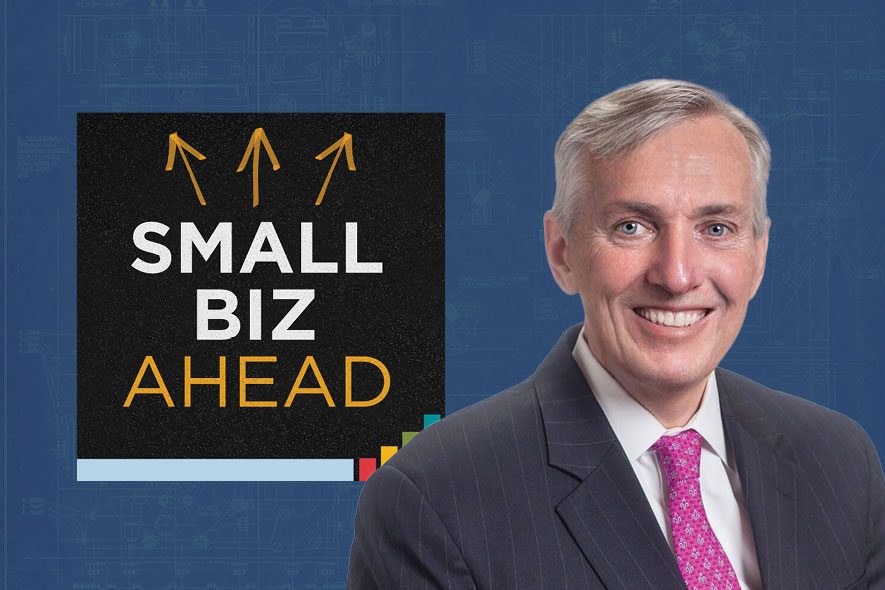Transcript
The views and opinions expressed on this podcast are for informational purposes only, and solely those of the podcast participants, contributors, and guests, and do not constitute an endorsement by or necessarily represent the views of The Hartford or its affiliates.
You’re listening to the Small Biz Ahead podcast, brought to you by The Hartford.
Our Sponsor
This podcast is brought to you by The Hartford. When the unexpected strikes, The Hartford strikes back for over 1 million small business customers with property, liability, and workers compensation insurance. Check out The Hartford’s small business insurance at TheHartford.com.
Gene (00:02):
Hey everybody, this is Gene Marks and welcome to another episode of the Hartford Small Biz Ahead podcast. Thank you so much for joining me. This week, I do wanna speak to you about a potential security issue that you need to be aware of because it’s getting bigger and bigger and bigger. Now, I know you’ve heard of ChatGPT, the artificial intelligence conversational bot that everybody’s freaking out about and doing all sorts of stuff and that’s very cool. But you should be aware of another scam that’s going on right now that uses artificial intelligence. It’s so big that the U.S. Federal Trade Commission actually issued a warning about it recently because it’s like a big deal. I mean, it almost sounds like science fiction, but it’s not science fiction.
Gene (00:51):
It is really, really the real thing. The scam has to do with fabricated voices. If you think about it, maybe you’ve heard of deepfake technology, but that’s… it’s becoming more and more common. Deepfake technology is where a scammer that’s well versed in artificial intelligence can grab a bunch of online content and make you think it’s somebody else. Recently there was some politicians that have been out there, if you look back in time that have been, their videos of them have been deepfaked. There’s videos of them online, and they were able to be manipulated so that they were doing things that you wouldn’t necessarily see them doing. And they’ve been out there and they look pretty realistic. I mean, if you look at, if you want to google like, deepfake of Mark Zuckerberg or Tom Cruise, or Barack Obama or Donald Trump, there’s videos out there that are pretty close to realistically making these people look like they’re saying and doing certain things.
Gene (01:56):
Well, there’s also a deepfake of audio as well. And an audio deepfake is where people get voice recordings of somebody and manipulate them to make it, make them say stuff that they didn’t really say. It’s like voice cloning. And the problem is, is that some scammers are now using this deepfake technology, this audio deepfake technology to take advantage of individuals and small businesses. They’re getting voices, recordings of someone and like somebody’s loved one or a doctor or an attorney or a relative or a business associate, and then changing it around so that, that person calls somebody unsuspecting and says they’re in trouble or they’re asking for money, or they want to transfer money from this until that. It’s something that’s been used to fool a lot of people. Just recently in Hong Kong, a bank manager was deepfaked by a hacker into believing that his boss was calling asking to transfer $35 million…
Gene (02:59):
To another account. And you know what? He did it. They never saw that money again. There were other deepfake incidents where employees, potential financial employees, were duped into thinking that their boss or an executive called them telling them to wire them money or exchange funds from this place to that place when actually it wasn’t. It was just a deepfake recording. Now, these recordings, believe it or not… I mean, I think of me, I have all of these podcasts that are out there that people can grab the transcription and these podcasts, my voice, and I’ve got so many words out there that with a little bit of time, a hacker could take whatever I’ve been saying and turn it into a realistic sounding conversation that I could be having, which could be getting up to no good.
Gene (03:45):
I don’t think I have anything that, I’m not gonna be asking anybody to transfer $35 million anytime soon. But it’s an issue. It’s a big issue and it’s a problem for your business as well, particularly your small business. Imagine your employee getting a call from a scammer not knowing it’s a scammer, thinking it’s you calling and saying, “Hey, transfer $10,000 to this bank account I need it for an emergency in the family.” And what do you know? You don’t know the difference. And a financial person does that, and suddenly you’re out 10,000 bucks. It’s a big deal. Some advice for you, okay? First of all, you gotta have a rule in the office that no one does any financial transactions over the phone, even if it’s you calling in. And even if you do call in, the rule has gotta be, they’ve always gotta call you back, okay?
Gene (04:32):
So if an employee gets a call from you asking for a financial transaction, the rule has to be like, okay, that’s fine, but the employee has to call you back on your number, just to verify that it is you calling. To be even more specific, you really should have internal controls over your cash in your business, which means that any transaction over a certain amount of money, $500, a thousand, $5,000, might require two or three signatures on a document. You can use like an electronic document signing service to do that before it’s authorized to actually transfer that money. So you’ve got a few sets of eyeballs looking at it before it actually happens. And most importantly, if you’re gonna make these rules, you gotta follow the rules. One of the biggest issues that I come across in the world of accounting, one of the biggest internal control challenges companies have, particularly small companies, is what’s called management override.
Gene (05:28):
Where you set a bunch of policies and rules and then you violate them because it’s your business. You’re like yes, I know a signature is required, but just shut up and gimme the money because it’s my business and you’re my employee. You have to resist doing that. You really do. It’s just a common thing among business owners to cut to the chase and I get it. But if you’re growing your business and you want to protect your money, you’ve really gotta set these rules and policies and then adhere to these rules and policies as well. If you wanna make sure that…
Speaker 3 (05:56):
Everything is being followed. This is becoming a bigger and bigger issue for businesses and individuals around the country. This rise in deepfake technology. It could be audio, it could be video, mostly from a business it’s gonna be an audio thing. It’s getting easier and easier to do, and easier and easier for people to be imposters. They claim that they’re you when they’re really not. And they can really do some financial damage to your business. So I urge you to make your employees aware of this. Make sure if they’re getting any calls for a financial transaction to call that person back. Have good written policies that require authorizations and sign offs. And please don’t override these controls. I know you’re the business owner, and I know you want to, you hate bureaucracy. Some bureaucracy is good, particularly when it comes to your money. So deepfakes, keep an eye out, but make sure you protect yourself against them. You’ve been listening to the Hartford Small Biz Ahead podcast. My name is Gene Marks and I hope you found this information helpful. If you need any other advice or tips or help in running your business, please visit us at SmallBizAhead.com or SBA.TheHartford.com. Thank you so much for listening. I’ll be back with another episode next week. Talk to you then. Take care.
Download Our Free eBooks
- Ultimate Guide to Business Credit Cards: The Small Business Owner’s Handbook
- How to Keep Customers Coming Back for More—Customer Retention Strategies
- How to Safeguard Your Small Business From Data Breaches
- 21 Days to Be a More Productive Small Business Owner
- Opportunity Knocks: How to Find—and Pursue—a Business Idea That’s Right for You
- 99 New Small Business Ideas





